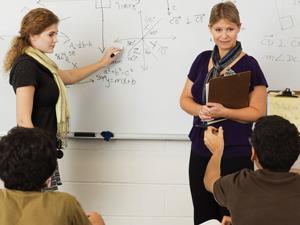A positive improvement in maths skills

It is widely recognised that mathematical skills are crucial to success in chemistry, and that those studying chemistry at school often exhibit a deficiency in this area. In particular, an inability to perform basic mathematical operations seriously inhibits students’ success in solving problems which incorporate chemical calculations. In order to address the problem, Fraser Scott, of Gryffe High School, Renfrewshire, UK, has implemented a system of ‘simulated peer-assessment’, with reportedly positive outcomes.
Peer-assessment is a widely used approach, which provides students with a valuable opportunity to evaluate the quality of an answer and to suggest how it might be improved, helping them to subsequently identify and address their own learning needs. This instils in them a sense of responsibility for their own learning, facilitating the development of the mind-set of a lifelong learner to the benefit of themselves in their future careers and to society as whole. However, there are a number of disadvantages associated with the peer assessment approach, including a lack of confidence with respect to marking classmates’ work and apprehension about being criticised by peers. There is also a risk that feedback may not be accurate or valuable, thus compromising the effectiveness of the process.
This study attempts to counter the disadvantages of peer-assessment while retaining the benefits of the approach by providing students with a teacher-generated incorrect solution to a problem that they were then required to ‘peer’-assess. The study took place in two parts, with 47 students aged 15/16 and 54 students aged 16/17 engaging with calculation-based problems which were representative of those commonly encountered at their respective levels of study.
Students undertook pre- and post- testing either side of the simulated peer-assessment activity, with significant gains being measured in both cases. The younger students improved from an average of 57% to 79%, while the older cohort improved from an average of 47% to 69%. Interestingly, students of intermediate mathematical ability made the biggest gains, with their more able peers having little room for improvement on their already high pre-test scores. Those with low working maths grades also showed little improvement, indicating that they might benefit from supplementary mathematical tuition. Furthermore, feedback from students indicated that they would have been unhappy to have had their work assessed by peers, compounding the benefits of the simulated approach which seems to have had a very positive impact on students’ ability to successfully tackle chemistry calculations.
References
F J Scott, Chem. Ed. Res. Pract., 2014 DOI: 10.1039/c4rp00078a









No comments yet